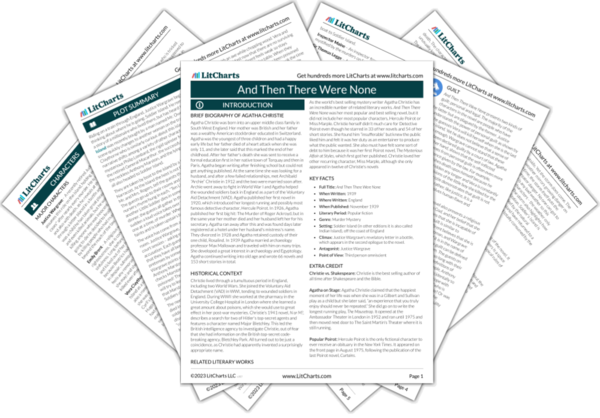Mystery novels, of which Agatha Christie is often considered the queen, generally present a complex and confusing cast of characters that, through the efforts of the detective/narrator/reader become organized into groups of good and bad, black and white. Generally, there are one or two criminals and lots of victims. And Then There Were None never works out this neatly. Agatha Christie presents justice as an ambiguous concept. Who deserves punishment and how much? The criminal of And Then There Were None, Justice Wargrave, is a justice fanatic. He believes that because the guests on Soldier's Island all committed crimes for which they were never punished, they now deserve to be emotionally tortured and eventually killed. Even if someone were to agree that the ten criminals deserve such punishment, Wargrave's conception of justice is complicated by the fact that, in the name of justice, he commits a much graver crime than any of the other characters in the novel.
Agatha Christie demonstrates that since humans are inherently flawed, justice is too. The ten victims in And Then There Were None were able to get away with their crimes because of some flaw in the system: there wasn't enough proof, the crime happened far away in another country, the death was caused by some accidental carelessness that does not count as murder. Yet when they get to Soldier's Island they enter a sort of penal colony where justice all of a sudden becomes an extremely rigid concept. By presenting the arbiter of justice as a life-long death and legal obsessed maniac, Agatha Christie shows the danger in a simplistic view of justice. There is a reason that the system is flawed, that one is innocent before proven guilty. There is no perfect way to catch and punish every criminal, but breaking from the existing, flawed system is even more dangerous. At the end of the novel, when the house and island are strewn with dead bodies it is hard to believe that the best answer to murder is more murder.
Justice ThemeTracker

Justice Quotes in And Then There Were None
“Watch and pray,” he said. “Watch and pray. The day of judgment is at hand.”

Unlock explanations and citation info for this and every other And Then There Were None quote.
Plus so much more...
Get LitCharts A+The faded blue eyes, shrewd in spite of their age, sized up Lombard. For a moment a judgment showed in them – had there been anyone to read it.
“Whoever it was who enticed us here, that person knows or has taken the trouble to find out a good deal about us all”
We're not going to leave the island … None of us will ever leave … It's the end, you see – the end of everything …”
He hesitated, then he said in a low strange voice:
“That's peace – real peace. To come to the end – not to have to go on … Yes, peace …”
“The damned fool, he believed every word I said to him. It was easy … I must be careful, though, very careful.”
“One more of us acquitted – too late!”
There was little pretense now – no formal veneer of conversation. They were five enemies linked together by a mutual instinct of self-preservation.
And all of them, suddenly, looked less like human beings. They were reverting to more bestial types.
They'd believe her all right. Cyril often told stories. He was an untruthful child. Cyril would know, of course. But that didn't matter … and anyway nothing would go wrong. She'd pretend to swim out after him. But she'd arrive too late … Nobody would ever suspect …
Had Hugo suspected? Was that why he had looked at her in that queer far-off way? … Had Hugo known?
“But don't you see, he's mad? It's all mad! The whole thing of going by the rhyme is mad! Dressing up the judge, killing Rogers when he was chopping sticks – drugging Mrs. Roberts so that she overslept herself – arranging for a bumble bee when Miss Brent died! It's like some horrible child playing a game. It's all got to fit in.”
“And therefore, sir, there must have been someone else on the island. Someone who tidied up when the whole business was over. But where was he all the time – and were did he go to? The Sticklehaven people are absolutely certain that no one could have left the island before the rescue boat got there. But in that case –”
…
“But in that case,” he said, “who killed them?”











